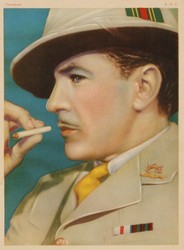GARY COOPER

His father was a judge who also owned a ranch, and Cooper went to college, but did not graduate, and ran his father's ranch afterwards, and also drew some cartoons for the local paper. When he was 23 his father left the bench and sold the ranch and his parents moved to California, and because Cooper could not make a living at his cartooning, he moved with them.
After a year of odd jobs, he started getting extra roles in movie westerns. He signed a contract with Paramount, and changed his first name to Gary. Cooper got progressively better roles in non-talkie movies, and had romances with some of his more famous co-stars, including Clara Bow and Lupe Velez.
In 1927, he played a small, but important role of a doomed flyer in Wings, which was a major breakthrough for him, and led to many better starring roles the following year. In 1929 he starred as the title character in The Virginian, which was made in both a talkie and non-talkie version.
He had become the man that women everywhere swooned over, and men wanted to be like him. In 1930 he starred in Morocco, opposite Marlene Dietrich, and in 1932 he was hand picked by Hemingway to star in A Farewell to Arms, and in 1936 he starred in Frank Capra's Mr. Deeds Goes To Town (nominated for the Best Actor Academy Award for this film).
He had his pick of movies, and many of the ones he turned down were then offered to similar actor Joel McCrea, who basically lived in Cooper's shadow throughout the 1930s. He turned down the lead role in Capra's Mr. Smith Goes to Washington (it started out as a Mr. Deeds sequel), and James Stewart got the role. He turned down the lead in Stagecoach, and that part made John Wayne a major star after toiling in B-westerns for many years.
His greatest blunder was turning down the role of Rhett Butler in Gone with the Wind. He said at the time, "Gone with the Wind is going to be the biggest flop in Hollywood history. I'm glad it'll be Clark Gable who' falling flat on his nose, not me"!
In 1941, Alvin York, the most decorated soldier in WWI, finally agreed to a movie being made of his life (to help recruiting efforts in WWII), but he insisted that only Cooper could play him, and Cooper won his first Oscar for that role in Sergeant York. The next year Lou Gehrig tragically died, and Cooper played him superbly in The Pride Of The Yankees (nominated for the Best Actor Academy Award for this film), and his "Today I am the luckiest man on the face of the Earth" speech is one of the great moments in movie history!
He was Robert Jordan in Hemingway's For Whom The Bell Tolls (nominated for the Best Actor Academy Award for this film), and Ayn Rand picked him to play Howard Roark in The Fountainhead. In 1952 he had one of the finest roles of his career, as Will Kane in High Noon, and he won a second Oscar. In 1960 he got prostate cancer, and he died the following year, at 60 years of age.
There will never be another star like Gary Cooper! He stayed a major leading actor for 25 solid years, starring in around 90 movies, and during that time he was the lead in important movies of all sorts, because so many writers, directors, and co-stars wanted him for their star!
I highly recommend all the movies noted above, but you really can't go wrong with any Gary Cooper movie, for his presence elevated even his lesser movies into something worth watching!
